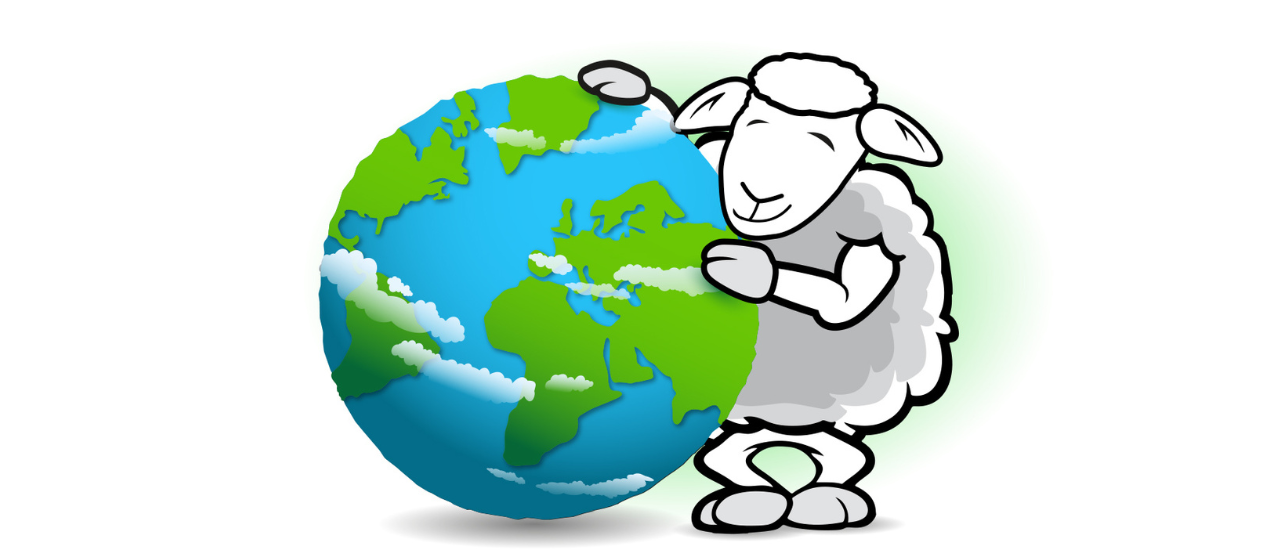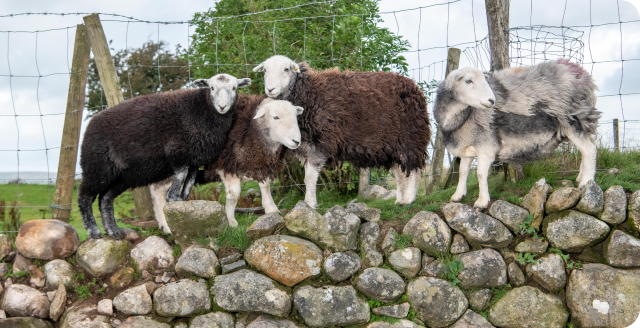
Chimney Sheep®
GET IN TOUCH
Customer Service:
01900 269 427
Mon - Fri 8:30am - 4:30pm
General Enquiries:
We live and breathe sustainability. Whilst our mission is to make sustainable living accessible, easy to understand and simple to implement for our customers, we also do everything we can to ensure we are as environmentally friendly as possible at Chimney Sheep.

Our sustainability policies and measures are a work in progress and we are constantly re-evaluating our internal practices as new sustainable materials, products and processes become available. We embrace new sustainable developments and options, and will always see how they can help us become more environmentally responsible as a company. Sometimes it’s a case of weighing up the options and we are always on the alert for more sustainable options.
People often comment about the fact that our main products, the Chimney Sheep® chimney draught excluders, are packed in plastic bags. They must be packed in something, to hold the handles + rods and instruction cards all together, and to stop the wool from moulting all over the place. If they’re packed in plastic then customers who doubt their measuring skills can try the product out in the bag first, then if it’s the wrong size send it back to us. We like to oblige but we can’t take back sooty sheep as we struggle to re-sell them - customers don’t really like buying sooty ones! We used to use biodegradable plastic, but this just creates microplastics if it doesn’t completely biodegrade, so we changed to recycled plastic.
We’ve looked at bioplastic and paper but we don’t want to create demand for materials made from crops that compete with food production or creates demand for trees to be felled. There’s a preconception that if it’s FSC it’s OK. But if you’ve seen woodland plantations that have been clear-felled, you realise what a drastic thing it is to cut down trees. It seems a completely extravagant thing to grow a tree for 80 years then cut it down to make paper bags and loo rolls. So, the answer is to recycle and repurpose. For us, to use recycled plastic for our Chimney Sheep® packaging bags is the best option. It just takes a bit of explaining.
Our Chimney Sheep® handles, extension rods and clamps are made from recycled plastic from scrapped cars. A lot of people hate plastic, and we do too in lots of instances. However, we have looked into using different materials for our handles, but right now, there isn’t anything that is suitable and cost-effective for customers. Sometimes, plastic is the best material for the job, but we’ve done the best we can by choosing recycled plastic. Take a read of this article to find out more.
We ask that when if there comes a time where you are getting rid of your Chimney Sheep®, you recycle the plastic components to ensure they don’t go into landfill. Or, if the wool felt head needs replacing (which shouldn’t be for at least 10 years), get in touch with us to purchase a replacement so that you can reuse the plastic components.
Wool is a sustainable material. Sheep need to be shorn for welfare reasons, and it’s a carbon store in itself (about 50% of wool is carbon). It also composts down, adding valuable nutrients back into the ground.
We use Herdwick wool for our Chimney Sheep® draught excluders, door draught excluders, wool rugs, felt shillies, SnugFeet insoles, pet beds and more. The Herdwick wool we collect, is from a local network of farmers in Cumbria. You can read more about how we collect it here. However, to ensure that out wool stays moth-free, it needs to be moth-proofed. We send our wool to Austria to get this done. But why? This gets asked a lot. Clothes moth larvae love wool, and they love to hide in dark places like chimneys. It’s the perfect place for mummy moth to lay her eggs so they can chew the wool to bits when they hatch out. We used borax for a while but this was not a satisfactory product both in terms of environmental impact and efficacy. We found a company in Austria called Lehner Wool that has pioneered a technology called Ionic Protect®. This is a certified biocide-free permanent protection that changes the ionic charge of the wool without the need for chemicals. It means the moths don’t recognise the wool as wool so fly on by hunting out wool elsewhere! It’s very clever, very simple and very effective. But Ionic Protect® is only available in Austria, so it does mean we have to ship our Herdwick wool there and back to be treated and felted. We choose hauliers who have carbon neutral strategies.
For some of our other wool products such as our insulation and some of our other wool products, the wool is sourced through a long-standing farming supplier network with different breeds of sheep. With long-term cooperation and responsible purchasing practices, purchasing structures for the sheep farmers are fair and ethical to ensure they have financial security.
Our biggest single use material is the packaging for sending out our goods. We use recycled plastic mail bags, recycled paper bags, recycled cardboard boxes, and where possible, reuse all our cardboard. Some of your orders might be in slightly scruffy looking boxes, but that’s because we’ve repurposed them from boxes that we’ve received deliveries in. It’s the same with some of the plastic packaging we receive – we repurpose the plastic bags the wool comes in. We do our best to make it look nice, but it’s a lot better to reuse as much as possible. Reuse, repurpose, recycle & buy recycled. In that order.
More packaging solutions have become available over the years. Paper tape was a milestone and we now use that to seal our boxes. Paper bubble wrap, that was an exciting moment too! We also use this as standard for all fragile items.
We ask that you either reuse our packaging as best you can or recycle it.
We hate waste at Chimney Sheep! We look at off-cuts and scraps and figure out useful uses for it. Our off-cuts of wool for example get cut into smaller bits which make excellent mulch and is what our felt shillies are. Other scraps we can’t use get sent away and mixed with more Herdwick wool and made into a lovely felt that’s great for all kinds of projects.
We even use other people’s waste products, such as leftover hessian sacks from our coffee-roasting friends at Carvetii Coffee. We use these to make our coffee sack door draught excluders, our outdoor cushions and sell them as sacks to use in the garden.
We’ve always sourced the gas and electric needed to run our offices and factory from 100% green suppliers.
We moved into our own premises (which houses our factory, fulfilment and offices) in September 2022, and since then have got rid of gas completely. We have installed solar panels put on our roof and export surplus to the grid. We deliberated over installing batteries to store the energy but these are expensive and add a layer of complication. When we aren’t generating enough solar energy of our own, we buy in electricity that is from specific wind and solar farms.
Our company car is also electric and is charged when we have a surplus of solar power so it effectively runs on sunshine!
We all recycle as much as we can of our own personal waste, bottles and cans and paper etc. We also compost food waste, tea bags and coffee grounds.
Our uniforms are all made of organic cotton.
We let the grass outside of our factory grow in the summer. We don’t need to plant wildflowers in it, there are already orchids and birdsfoot trefoil and multitude of other wildflowers pre-existing. They just needed to not be mowed for a season, and there they were!
Our carpets are made of recycled plastic.
Our print work for packaging is printed on recycled card with vegetable inks.
The paper for our office stationary is recycled and we always ensure we use scrap paper where possible.
The ink in our laser printers isn’t vegetable ink and which bothers us, but we’re working on this.
We don’t capture our own rainwater to flush the loos but that is something we hope to be able to do in the future.
Our products are only allowed in our collection if they have a sustainability role to play. We want to help our customers make sense of sustainable living by creating and curating simple, functional, environmentally-friendly house & garden products that can be found all in one place. We don’t like pulling the wool over your eyes (excuse the pun) so are always transparent as to how each of our products work and why they are sustainable. We also will continually remind you to consume mindfully and not unnecessarily – if you don't need it, don't buy it. That is true sustainable living, after all!
As you are probably aware, 20% of our profits go to our Community Interest Company, Buy Land Plant Trees. We buy land and we plant trees on agriculturally poor land.
But we don’t just plant trees. We have also started the process of repairing a peat bog, we put up owl boxes, put up bat boxes and bird boxes, dig ponds, plant (or encourage) other plants than trees and leave dead wood to rot down for creatures that like dead wood. All sorts of stuff that is beneficial to the local and wider environment.

Receive energy saving tips, gardening advice, news about our latest products, progress updates on our Buy Land Plant Trees initiative and exclusive access to our secret sales!